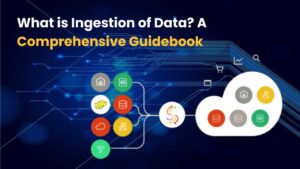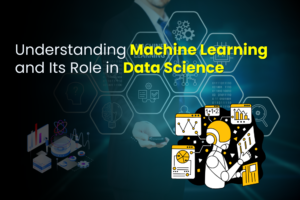As we advance deeper into the data-driven era, data science continues to evolve at a rapid pace, reshaping industries and redefining careers. The year 2025 stands as a turning point, marking significant transformations in technologies, tools, roles, and expectations in the field. The need for qualified data professionals is growing as more and more businesses rely on data to obtain a competitive edge.
This article explores the top trends shaping data science in 2025 and the most promising career paths aspiring professionals can pursue to stay ahead in the ever-changing landscape.
Top Trends in Data Science in 2025
1. Generative AI Integration in Data Science
The rise of generative AI (like GPT-4 and successors) is revolutionizing how data scientists approach tasks. From automating feature engineering to generating synthetic datasets, generative AI is enabling faster, more accurate model development.
Key Impacts:
- Automating report generation and data interpretation.
- Enhancing creativity in predictive modeling.
- Better handling of unstructured data like text and images.
2. Automated Machine Learning (AutoML) Is Mainstream
AutoML platforms will have matured by 2025, enabling non-experts to train models without in-depth knowledge of algorithms or tuning. However, data scientists still play a crucial role in understanding context, preparing quality data, and evaluating outcomes.
Examples:
- Google Cloud AutoML
- H2O.ai
- DataRobot
3. Edge AI & Real-Time Analytics
Real-time data processing at the source, such as IoT devices, is made possible by edge computing and AI models. Data scientists must now build models optimized for low-latency environments.
Use Cases:
- Smart factories
- Autonomous vehicles
- Healthcare monitoring systems
4. Ethical AI and Explainability
As AI decisions influence critical areas like finance, law, and healthcare, AI explainability and ethics are now non-negotiable. In 2025, models must be auditable, transparent, and free of bias.
Tools in Demand:
- SHAP (SHapley Additive exPlanations)
- LIME (Local Interpretable Model-agnostic Explanations)
- Fairlearn
5. Data-Centric AI Development
Data scientists are focusing more on data quality than model complexity. The paradigm has shifted toward data-centric AI, where efforts are concentrated on improving training datasets to build robust models.
Key Aspects:
- Handling noisy labels
- Better data annotation practice
- Automated data validation pipelines
6. Multi-Modal and Cross-Modal Learning
In 2025, models are expected to handle various data types—text, image, audio, and structured data—simultaneously. Multi-modal learning is now a critical skill for data scientists working in areas like robotics, healthcare diagnostics, and entertainment.
Example:
Combining CT scan images and clinical records for disease prediction.
7. No-Code and Low-Code Data Science Platforms
More organizations are adopting no-code platforms for quick experimentation. While these tools make data science accessible, skilled professionals still lead in high-impact and custom solutions.
Popular Tools:
- KNIME
- RapidMiner
- Microsoft Power BI with integrated AI
8. Quantum Computing in Data Science
While still emerging, quantum computing is starting to influence data science workflows, especially in areas requiring large-scale simulations and optimization.
Master AI, ML & Python—Join Our Data Science Classes in Pune Now!
Career Paths in Data Science: Roles and Roadmaps
1. Data Scientist
Overview:
Large datasets must be analyzed by a data scientist in order to draw conclusions, build models, and assist companies in making data-driven choices.
Skills Required:
- Python/R, SQL
- Machine Learning (Scikit-learn, TensorFlow, PyTorch)
- Data Visualization (Matplotlib, Seaborn, Power BI)
Future Outlook:
Data scientists are now expected to also understand MLOps practices, version control, and deployment strategies.
Average Salary (2025, Global Estimate):
$110,000–$160,000 USD annually
2. Machine Learning Engineer
Overview:
Building, honing, and implementing ML models in real-world settings are the main responsibilities of machine learning engineers.
Skills Required:
- Deep learning frameworks (TensorFlow, PyTorch)
- Model optimization
- Cloud platforms (AWS SageMaker, GCP Vertex AI)
Future Outlook:
Strong growth is expected, with demand in robotics, personalized medicine, and autonomous systems.
Salary Range:
$120,000–$180,000 USD
3. Data Engineer
Overview:
The infrastructure for gathering, cleaning, storing, and making data available for analysis is created by data engineers.
Skills Required:
- ETL tools (Apache Airflow, NiFi)
- Big Data (Spark, Hadoop)
- Data Lakes and Warehouses (Snowflake, Redshift)
Future Outlook:
Data engineers are evolving into data platform architects, with a strong understanding of cloud-native pipelines.
Salary:
$100,000–$150,000 USD
4. AI Research Scientist
Overview:
Creating new algorithms and expanding the capabilities of AI technology are part of this profession.
Skills Required:
- Deep learning, reinforcement learning
- Mathematical foundations (Linear algebra, statistics)
- Research publication experience
Future Outlook:
In 2025, these roles are often seen in autonomous tech, biotech, and quantum AI startups.
Salary:
$130,000–$200,000 USD+
5. Business Intelligence (BI) Analyst
Overview:
BI analysts interpret business data and visualize insights to support strategic decisions.
Skills Required:
- BI Tools (Tableau, Power BI)
- SQL and Excel
- Business domain understanding
Future Outlook:
Modern BI analysts are also expected to understand basic predictive analytics and AI-based dashboards.
Salary:
$70,000–$110,000 USD
Get Certified in Data Science from Pune Top Trainers—Apply Today!
6. Data Analyst
Overview:
Entry-level role focused on extracting meaning from data using queries, reports, and visualizations.
Skills Required:
- Excel, SQL, Python
- Data visualization (Matplotlib, Plotly)
- Data storytelling
Future Outlook:
By 2025, analysts will have evolved into analytics engineers, bridging the gap between business and data engineering teams.
Salary:
$60,000–$95,000 USD
7. MLOps Engineer
Overview:
An MLOps engineer ensures smooth deployment and monitoring of machine learning models.
Skills Required:
- Docker, Kubernetes
- Model versioning (MLflow, DVC)
- CI/CD for ML (Jenkins, GitHub Actions)
Future Outlook:
As companies mature in AI adoption, MLOps roles are crucial for scaling models reliably.
Salary:
$110,000–$170,000 USD
8. Data Privacy Officer/Data Ethics Consultant
Overview:
Specialists ensure that data collection, storage, and model decisions are ethical, legal, and transparent.
Skills Required:
- GDPR, CCPA compliance knowledge
- Ethical AI frameworks
- Risk assessment and bias detection
Future Outlook:
Growing demand in healthcare, finance, and AI governance sectors.
Salary:
$90,000–$130,000 USD
Future Skills in Demand for Data Science Careers
In 2025, companies are hiring not just for traditional technical skills but also for cross-disciplinary expertise. Below are the top skills gaining momentum:
A. Cloud and DevOps Integration
Kubernetes
Terraform
Cloud ML services
B. Natural Language Processing (NLP)
Hugging Face Transformers
LLM fine-tuning
Text summarization & Q&A systems
C. Advanced Visualization & Storytelling
Interactive dashboards
Data storytelling using narrative frameworks
Real-time visualization with streaming data
D. Cybersecurity for Data Science
Securing pipelines
Access management
Privacy-aware machine learning
E. Domain Specialization
FinTech (fraud detection, algorithmic trading)
Healthcare (predictive diagnostics, genomics)
E-commerce (recommendation systems, A/B testing)
Certifications to Boost Data Science Careers in 2025
- Microsoft Certified: Azure Data Scientist Associate
- Google Professional Data Engineer
- AWS Certified Machine Learning – Specialty
- Databricks Certified Data Engineer
- ICCP’s Certified Data Professional (CDP)
Final Thoughts
The data science landscape in 2025 is both challenging and rewarding. With new tools, platforms, and demands surfacing almost monthly, it is no longer sufficient to master only the basics. Today’s professionals need to adopt a lifelong learning mindset, stay current with industry trends, and develop domain-specific expertise.
Whether you’re just entering the field or looking to pivot into a more advanced role, aligning your skill set with the trends and career paths discussed above will ensure that you thrive in the data-driven world of tomorrow.






